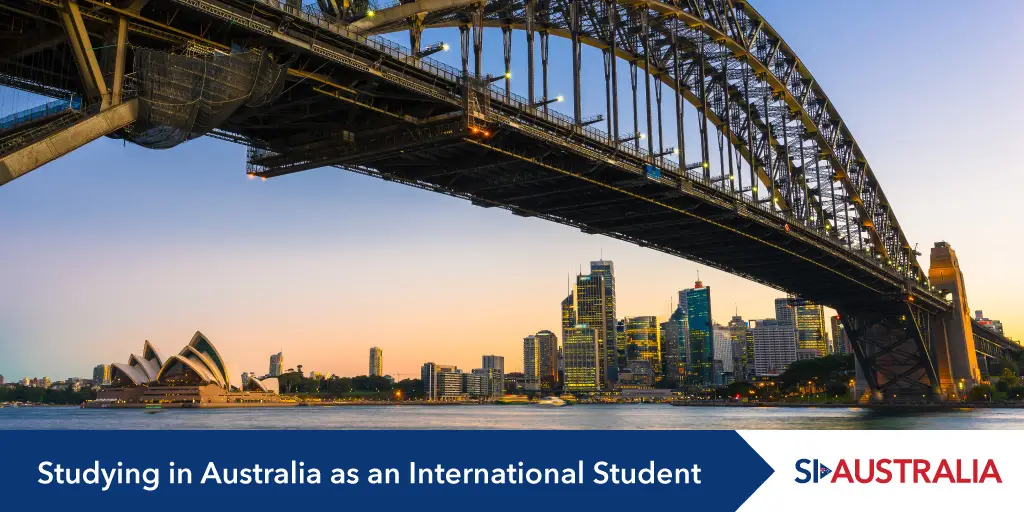When we think about Australia, we often picture beautiful coral reefs, stunning landscapes, and sandy beaches. However, there's much more to Australia, especially regarding education, and studying in Australia as an international student offers many benefits.
Embarking on an educational journey in Australia can be a transformative experience, offering a blend of world-class education, vibrant campus life, and a multicultural environment. Whether you’re drawn by Australia’s top-ranking universities, its commitment to research excellence, or the opportunity to immerse yourself in a new culture, this guide will provide you with the essential steps to make your dream a reality.
Learn more about studying in Australia below and have any further questions answered, or begin your application, by arranging a free consultation today.

Step-by-Step Guide to Studying in Australia
1. Research Different Universities and Programs
Students willing to take admissions in Australia must do intense research and study about the Australian Education System, courses, and universities. Take your time, learn, and study the universities' culture and curriculum so that blending with a new culture and competitive environment can be easy.
Once you have decided what to study, it’s time to look for the best universities or institutions. Look for different factors that make a university stand out from the crowd. For example, their global reputation and ranking, employability rate, education experience, number of degrees and courses offered, and number of international students enrolled. Shortlist around 7 to 10 universities and jot down the programs available. Study the transition period with tuition fees, scholarships, and application deadlines.
2. Speak to an SI-Australia Consultant
Ready to make the next move? Make an appointment with our SI-Australia consultant and understand the admission process from scratch. Our counsellors are proficient, personally certified with years of experience, and have also been international students. They know what it is like to have the correct information before heading to a new space. So, if you have decided to study abroad, let’s work together and find out all the small and big details to ensure the best fit between you and your future university.
3. Submit your application
After appearing in the various standardised tests, it’s time to register for the universities you have shortlisted. While applying for colleges and universities, read the brochure carefully. Keep all your documents handy. Your SI-Australia consultant will guide you through the rules and regulations.
4. Accept your offer
After applying to various universities in Australia, be patient and await a response. Universities usually take time to review application forms and shortlist applicants. Once a student receives an acceptance letter, read it carefully. Understand all the details included in the letter. The acceptance letter may have instructions on how to respond to the university. Follow this instructions and let the university know whether you plan to accept or decline the offer.
5. Apply for a Student Visa
Once you have accepted the offer letter, it’s time to apply for a student visa. Applying for a student visa helps you receive scholarships, affordable tuition fees, a four-year post-study work permit, and much more. The success rate for an Australian study visa is 23.3% for higher education, 18.9% for training and vocational education, and 11.8% for postgraduate research education.
6. Begin study!
Once the visa application is approved, students can book their tickets. Make sure to schedule your flight before the academic session. With everything in order, students can now fasten their seat belts and look forward to embarking on their education journey and making the most out of it.
Top Five Universities in Australia
There are 35 universities in Australia, nine of which have ranked among the top 100 in the QS World University Rankings 2025. Here are its top five.
1. The University of Melbourne
Melbourne University is a public research university that ranked 13th globally in the 2025 QS World University Rankings. It offers undergraduate, postgraduate, and graduate research and professional development courses in fields such as science, engineering, arts and humanities, and management. It is the best university in Australia with a vibrant campus, research centres, and accommodation facilities.
2. The University of Sydney
The University of Sydney is one of Australia's most popular and oldest universities. The QS World Rankings 2025 ranked 18th globally, and over 30 subjects ranked in the top 50 worldwide. USYD, Australia aims to allow everyone to realise their potential through education, offering undergraduate and postgraduate computer science, law, music, medicine, and health courses. The degree programs are combined with elective placements, practical training, and internships that give you the chance to enhance your employability.
3. The University of New South Wales
Founded in 1949, the University of New South Wales is a public research university ranked 19th in the QS World University Rankings 2025. It is considered one of Australia’s leading research institutions, offering undergraduate, postgraduate, and doctorate courses in various fields. Student life at UNSW is more than just earning a degree. Here, you can try new things and become more independent in your career and life.
4. The Australian National University
Australian National University is a public research university in Canberra, Australia. It is ranked 30th in the QS World University Rankings 2025. From arts and humanities to music degrees, ANU offers single and double degrees according to your requirements. Apart from academics, the university also provides scholarships to support the financial needs of students.
5. Monash University
With over 100 global partners and ranking 37th in the QS World Ranking 2025, Monash University is making a difference worldwide. You can access research collaborations, international partnerships, and overseas opportunities as a Monash student. The university offers one of Australia's most extensive ranges of degrees, including over 140 double-degree options. In addition, several funding options are available for international students to support their studies. If you want to work in a global workspace, Monash University is the right place to start your career with.
Post-Study Work Permit
The Post-Study Work Permit in Australia allows you to stay and work for a specific period after completing your degree. The permit has many benefits, including gaining valuable work experience at a global level and earning practical skills in the field of study. The duration of the post-study work permit depends on the study level completed. Different Australian Student Visas are available for international students, such as Temporary Graduate Visas (subclass 485) and Temporary Graduate Visas (post-study work streams).
Job Prospects in Australia
Due to Australia's thriving economy, international students in Australia have access to top jobs, whether full-time or part-time. The courses in Australia offer a promising job scenario, providing students with knowledge and skills essential for success in the corporate world. Some popular industries include healthcare, business management, banking and finance, legal, and social work. The average salary in Australia is AUD 80,924 annually, whereas entry-level positions can make up to AUD 68,452 annually, and an experienced employee can earn around $112,803 annually.
Cost of Living in Australia
The cost of living and education in Australia can depend on the city, lifestyle, and the university you choose to study. International students can expect to spend around AUD 20,290 annually on living expenses, including accommodation, food, transportation, and other necessities. The average cost of studying for a bachelor’s degree can range from AUD 20,000 to AUD 45,000 per year, while postgraduate programs can range from AUD 22,000 to AUD 50,000 per year. Therefore, planning and budgeting for living and tuition fees is important. Besides, scholarships, grants, and part-time jobs are available to help offset some of these costs for international students.
Scholarships
Studying in Australia can be highly beneficial if you apply for scholarships. Australia offers more than 1,000 scholarships to international students. These scholarships provide an average monthly stipend of $20,000, tuition fees, accommodation expenses, health insurance, and travel allowances.
Why Study in Australia?
1. An extensive education system
Universities in Australia offer quality education with a comprehensive curriculum and highly qualified teachers. The Australian Education System provides primary, secondary, and tertiary education and is distinguished from many other countries by the Australian Qualifications Framework (AQF). The AQF is a national policy that shows how qualifications relate to each other at each level of education.
2. Australia has six of the world’s top universities
Australia is home to some of the top universities in the world. Australian educational institutions are known for their academic excellence and research in arts and humanities, education, and sciences, and these universities have nurtured 15 noble laureates.
3. Land of languages
English is spoken widely in Australia but is not the country's official language. There are over 200 dialects spoken and languages spoken by people. Australia's top five languages are Mandarin, Arabic, Cantonese, Italian, and Vietnamese.
4. Student satisfaction is high
According to a Department of Education International Student Survey, 90% of international students are delighted with their living and study experience in Australia.
5. Affordable cost of living
The cost of living and tuition fees in Australia is low compared to other countries while living standards are some of the highest in the world. However, the cost of living depends on the city you choose to study. Besides that, Australia allows students to work part-time and support themselves financially, thus making it easier for students to thrive and survive while gaining hands-on experience.
6. Diverse culture and society
Australia is multicultural, diverse, welcoming, and inclusive for international students. They can interact with people from various backgrounds, enhancing their global perspective and cross-cultural communication skills.
7. Economic power
Australia has the world’s most extensive and highly developed economy. In terms of wealth, it stands second after Switzerland. The service sector forms the dominant section of the economy, with the most significant contribution towards GDP and employment among 80 per cent of the total labour force in the country.
Study in Australia
Australia’s extensive education system, top-ranked universities, and high student satisfaction rates make it an attractive destination. The country’s affordable living costs, diverse culture, and strong economy further enhance its appeal.
If you want to begin applying to study in Australia, contact SI-Australia today for a free consultation.
FAQ
Can I work and study in Australia?
Yes, a student can work and study in Australia with a student visa that permits them to work and stay financially independent. If accepted to study at an Australian University, you are granted a student visa (Subclass 500).
Does the cost of studying UG and PG in Australia vary?
Yes, the cost of studying UG and PG courses varies, depending on the choice of courses, specialisations, and duration of study.
What study program is best in Australia?
Australia offers a wide range of courses and programs. However, the most in-demand courses in Australia include Business, Arts, Hospitality Management, Computing, Medical and Health Sciences, and Engineering.
How much does it cost to study in Australia?
The fee structure varies for different programs. For example, the average fee for a bachelor’s course is between $15,000 and $33,000 annually, and for a master’s, it is around $20,000 to $37,000 annually.
Can I work part-time in Australia after graduation?
Students completing Australian University requirements can work part-time by applying for a post-study work permit under the graduate stream. They are allowed to work 20 hours weekly. However, students enrolled for ELICOS are not eligible for a study Work Permit for Australia.






















































































